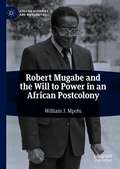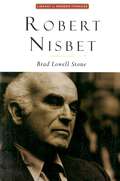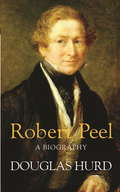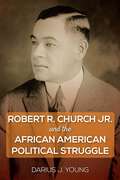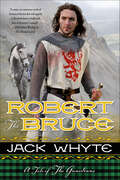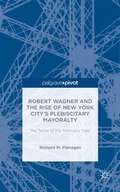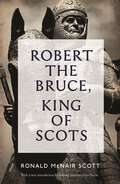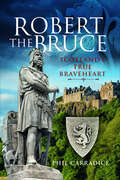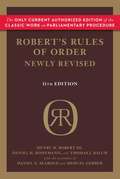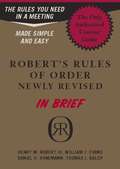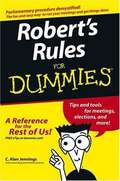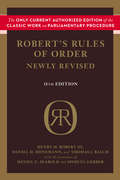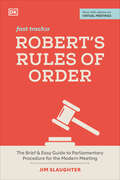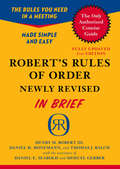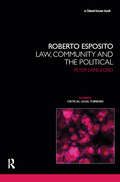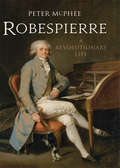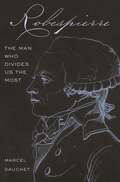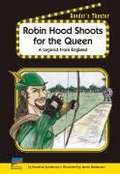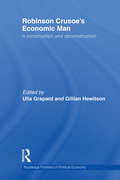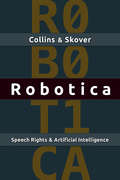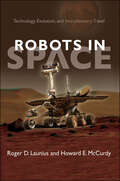- Table View
- List View
Robert Mugabe and the Will to Power in an African Postcolony (African Histories and Modernities)
by William J. MpofuThis book is a philosopher’s view into the chaotic postcolony of Zimbabwe, delving into Robert Mugabe’s Will to Power. The Will to Power refers to a spirited desire for power and overwhelming fear of powerlessness that Mugabe artfully concealed behind performances of invincibility. Nietzsche’s philosophical concept of the Will to Power is interpreted and expanded in this book to explain how a tyrant is produced and enabled, and how he performs his tyranny. Achille Mbembe’s novel concept of the African postcolony is mobilised to locate Zimbabwe under Mugabe as a domain of the madness of power. The book describes Mugabe’s development from a vulnerable youth who was intoxicated with delusions of divine commission to a monstrous tyrant of the postcolony who mistook himself for a political messiah. This account exposes how post-political euphoria about independence from colonialism and the heroism of one leader can easily lead to the degeneration of leadership. However, this book is as much about bad leadership as it is about bad followership. Away from Eurocentric stereotypes where tyranny is isolated to African despots, this book shows how Mugabe is part of an extended family of tyrants of the world. He fought settler colonialism but failed to avoid being infected by it, and eventually became a native coloniser to his own people. The book concludes that Zimbabwe faces not only a simple struggle for democracy and human rights, but a Himalayan struggle for liberation from genocidal native colonialism that endures even after Robert Mugabe’s dethronement and death.
Robert Nisbet: Communitarian Traditionalist
by Brad Lowell StoneA great new book from Regnery Publishing!This is the only book-length intellectual biography of sociologist Robert Nisbet (1913-1996).
Robert Peel: A Biography
by Douglas HurdThe life of one of the greatest British Prime Ministers - by an author who knows the scene from his years as a senior Minister in Margaret Thatcher's Cabinet.Robert Peel (1788-1850), as much as any man in the nineteenth century, transformed Great Britain into a modern nation. He invented our police force, which became a model for the world. He steered through the Bill which allowed Catholics to sit in Parliament. He reorganised the criminal justice system. Above all he tackled poverty by repealing the Corn Laws. Thanks to Peel the most powerful trading nation chose free trade and opened the door for our globalised world of today.Peel was not all politics. He built two great houses, filled them with famous pictures and was devoted to a beautiful wife. Many followers never forgave him for splitting his Party. But when in 1850 he was carried home after a fall from his horse crowds gathered outside, mainly of working people, to read the medical bulletins. When he died a few days later, factories closed, flags flew at half-mast and thousands contributed small sums to memorials in his honour. He was the man who provided cheap bread and sacrificed his career for the welfare of ordinary people.
Robert Peel: A Biography
by Douglas HurdThe life of one of the greatest British Prime Ministers - by an author who knows the scene from his years as a senior Minister in Margaret Thatcher's Cabinet.Robert Peel (1788-1850), as much as any man in the nineteenth century, transformed Great Britain into a modern nation. He invented our police force, which became a model for the world. He steered through the Bill which allowed Catholics to sit in Parliament. He reorganised the criminal justice system. Above all he tackled poverty by repealing the Corn Laws. Thanks to Peel the most powerful trading nation chose free trade and opened the door for our globalised world of today.Peel was not all politics. He built two great houses, filled them with famous pictures and was devoted to a beautiful wife. Many followers never forgave him for splitting his Party. But when in 1850 he was carried home after a fall from his horse crowds gathered outside, mainly of working people, to read the medical bulletins. When he died a few days later, factories closed, flags flew at half-mast and thousands contributed small sums to memorials in his honour. He was the man who provided cheap bread and sacrificed his career for the welfare of ordinary people.
Robert R. Church Jr. and the African American Political Struggle
by Darius J. YoungSouthern Conference on African American Studies, Inc., C. Calvin Smith Book AwardThis volume highlights the little-known story of Robert R. Church Jr., the most prominent black Republican of the 1920s and 1930s. Tracing Church’s lifelong crusade to make race an important part of the national political conversation, Darius Young reveals how Church was critical to the formative years of the civil rights struggle. A member of the black elite in Memphis, Tennessee, Church was a banker, political mobilizer, and civil rights advocate who worked to create opportunities for the black community despite the notorious Democrat E. H. “Boss” Crump’s hold over Memphis politics. Spurred by the belief that the vote was the most pragmatic path to full citizenship in the United States, Church founded the Lincoln League of America, which advocated for the interests of black voters in over thirty states. He was instrumental in establishing the NAACP throughout the South as it investigated various incidents of racial violence in the Mississippi Delta. At the height of his influence, Church served as an advisor for Presidents Harding and Coolidge, generating greater participation of and recognition for African Americans in the Republican Party. Church’s life and career offer a window into the incremental, behind-the-scenes victories of black voters and leaders during the Jim Crow era that set the foundation for the more nationally visible civil rights movement to follow. Publication of the paperback edition made possible by a Sustaining the Humanities through the American Rescue Plan grant from the National Endowment for the Humanities.
Robert The Bruce: A Tale of the Guardians (The Guardians #2)
by Jack WhyteThe acclaimed author of The Forest Laird delivers “a bold, brash tribute to . . . one of medieval Scotland’s fiercest warriors and its most revered king” (Booklist).Robert I, or as he is known to a grateful Scottish nation, Robert the Bruce, was one of Scotland’s greatest kings, as well as one of the most famous warriors of his generation. He led the valiant Scots in the Wars of Scottish Independence against the Kingdom of England. His reign saw the recognition of Scotland as an independent nation, and today Bruce is remembered as a national hero. In this vividly detailed biographical novel, Jack Whyte brings this legend of history to gritty, passionate life.In the late thirteenth century, Robert and his father joined the rebellion against John Balliol, England’s appointed king of Scotland. Thus began his decades-long fight for Scottish freedom. He was a tireless campaigner in both battle and diplomacy. Finally, in May of 1328, King Edward III signed the Treaty of Edinburgh-Northampton, which recognized Scotland as an independent kingdom and Bruce as its king.
Robert Wagner and the Rise of New York City’s Plebiscitary Mayoralty: The Tamer of the Tammany Tiger
by Richard M. FlanaganRobert Wagner was New York City's true New Deal mayor, killed Tammany Hall. The world Wagner shaped delivers municipal services efficiently at the cost of local democracy. The story of Wagner's mayoralty will be of interest to anyone who cares about New York City, local democracy and the debate about the legacy of the City's important leaders.
Robert the Bruce, King of Scots: King of Scots
by Ronald McNair Scott&“A heroic biography of one of Scotland's legendary leaders, by a British novelist and former literary critic for the London Sunday Times&” (Kirkus). Robert the Bruce had himself crowned King of Scots at Scone on a frozen March morning in 1306. After years of struggle, Scotland had been reduced to a vassal state by Edward I of England. Its people lived in abject poverty. But on the day he seized the crown, Bruce renewed the fight for Scotland&’s freedom, and let forth a battle cry that would echo through the centuries. Using contemporary accounts, Ronald McNair Scott tells the story of Scotland&’s legendary 14th century leader, and one of Europe&’s most remarkable medieval kings. From Bruce&’s historic victory against England in the Battle of Bannockburn to the day in 1324 when the Pope recognized him as king of an independent Scotland, this is a story of a man whose life shaped a nation.&“A thundering good narrative … splendidly told.&”—Sunday Telegraph, UK
Robert the Bruce: Scotland's True Braveheart
by Phil CarradiceRobert the Bruce is a detailed account of the life and times of the Scottish hero and monarch. It covers his life from childhood to death, looking at the political, social and military life of Scotland before, during and after the time of Robert the Bruce. The book looks at the relationship between The Bruce and people like Edward I and Edward II of England, William Wallace and the other contenders for the Scottish crown. The main thrust of the book is a chronological account of how The Bruce clawed his way to power, his struggles and battles and his eventual victory which gave Scotland independence and freedom from an acquisitive and warlike neighbour. It looks in detail at the murder of John Comyn, of which The Bruce stood accused, and the political ramifications of the killing. Robert the Bruce was no saint. He was a ruthless, cunning warrior, a man of his times, dedicated to what he saw as his mission in life. Flawed he may have been but he was also a great King, a worthy warrior and a man who deserves to emerge from the shadow of William Wallace - a position to which he has been relegated ever since the film Braveheart.
Robert's Rules Of Order (Newly Revised, 11th Edition)
by Henry M. III Robert William J. Evans Daniel H. Honemann Thomas J. Balch Shmuel Gerber Daniel E. SeaboldRobert's Rules of Order is the book on parliamentary procedure for parliamentarians and anyone involved in an organization, association, club, or group and the authoritative guide to smooth, orderly, and fairly conducted meetings and assemblies. This newly revised edition is the only book on parliamentary procedure to have been updated since 1876 under the continuing program of review established by General Henry M. Robert himself, in cooperation with the official publisher ofRobert's Rules. The eleventh edition has been thoroughly revised to address common inquiries and incorporate new rules, interpretations, and procedures made necessary by the evolution of parliamentary procedure, including new material relating to electronic communication and "electronic meetings. "
Robert's Rules Of Order Newly Revised In Brief
by Henry M. III Robert William J. Evans Daniel H. Honemann Thomas J. BalchGoing to a meeting? Want to know how to take part? Learn quickly and easily! This short, simple book includes: Sample dialogues to get you confidently through motions, nominations, elections, votes, debates, amendments, and more Invaluable tips for keeping meetings orderly and on track A chapter answering the most frequently asked questions Not sure what to do at a meeting? Handy tables at the back of the book tell you just what to say Appointed to a committee? Elected an officer or board member? Chosen as a convention delegate? Chapters on each clearly explain your duties
Robert's Rules for Dummies
by C. Alan JenningsNeed to read up on Robert's Rules? Relax! This clear, easy-to-use guide makes parliamentary procedure simple to understand and apply.
Robert's Rules of Order
by Henry M. Robert III"Robert's Rules of Order" is "the" book on parliamentary procedure for parliamentarians and anyone involved in an organization, association, club, or group and the authoritative guide to smooth, orderly, and fairly conducted meetings and assemblies. This newly revised edition is the only book on parliamentary procedure to have been updated since 1876 under the continuing program of review established by General Henry M. Robert himself, in cooperation with the official publisher of "Robert's Rules. " The eleventh edition has been thoroughly revised to address common inquiries and incorporate new rules, interpretations, and procedures made necessary by the evolution of parliamentary procedure, including new material relating to electronic communication and "electronic meetings. "
Robert's Rules of Order
by Henry M. Robert III"Robert's Rules of Order" is "the" book on parliamentary procedure for parliamentarians and anyone involved in an organization, association, club, or group and the authoritative guide to smooth, orderly, and fairly conducted meetings and assemblies. This newly revised edition is the only book on parliamentary procedure to have been updated since 1876 under the continuing program of review established by General Henry M. Robert himself, in cooperation with the official publisher of "Robert's Rules. " The eleventh edition has been thoroughly revised to address common inquiries and incorporate new rules, interpretations, and procedures made necessary by the evolution of parliamentary procedure, including new material relating to electronic communication and "electronic meetings. "
Robert's Rules of Order Fast Track: The Brief and Easy Guide to Parliamentary Procedure for the Modern Meeting
by Jim SlaughterMust-Have Advice on Running Effective and Organized MeetingsEasy, accessible, and to the point. Robert's Rules of Order Fast Track gives you everything you need to know to conduct shorter, fairer, and more orderly meetings. In this new and improved update, you'll find: -The fundamentals of parliamentary procedure, with tips on knowing which rules to use for your meetings. -Simple suggestions for making, seconding, and debating motions. -A primer on voting, from knowing when it's required, to breaking ties, to handling absentee and proxy votes. -Straightforward strategies for setting and sticking to an agenda and efficiently recording your meeting's minutes. -Tips for handling disruptive members and tyrannical chairs. -All-new guidance on conducting the modern virtual meeting.
Robert's Rules of Order Newly Revised in Brief
by William J. Evans Daniel H. Honemann Thomas J. Balch Henry M. Robert IIIGoing to a meeting? Want to know how to take part? Learn quickly and easily! This short, simple book includes: Sample dialogues to get you confidently through motions, nominations, elections, votes, debates, amendments, and more Invaluable tips for keeping meetings orderly and on track A chapter answering the most frequently asked questions Not sure what to do at a meeting? Handy tables at the back of the book tell you just what to say Appointed to a committee? Elected an officer or board member? Chosen as a convention delegate? Chapters on each clearly explain your duties
Roberto Esposito: Law, Community and the Political (Nomikoi: Critical Legal Thinkers)
by Peter LangfordRoberto Esposito: Law, Community and the Political provides a critical legal introduction to this increasingly influential Italian theorist’s work, by focusing on Esposito’s reconceptualisation of the relationship between law, community and the political. The analysis concentrates primarily on Esposito’s Catégories de l’Impolitique, Communitas, Immunitas and Bíos, which, it is argued, are animated by an abiding concern with the position of critique in relation to the tradition of modern and contemporary legal and political philosophy. Esposito’s fundamental rethinking of these notions breaks with the existing framework of political and legal philosophy, through the critique of its underlying presuppositions. And, in the process, Esposito rethinks the very form of critique. As the first monograph-length study of Esposito in English, Roberto Esposito: Law, Community and the Political will be of considerable interest to those working in the areas of contemporary legal and political thought and philosophy.
Robespierre
by Peter McpheeFor some historians and biographers, Maximilien Robespierre (1758-94) was a great revolutionary martyr who succeeded in leading the French Republic to safety in the face of overwhelming military odds. For many others, he was the first modern dictator, a fanatic who instigated the murderous Reign of Terror in 1793-94. This masterful biography combines new research into Robespierre's dramatic life with a deep understanding of society and the politics of the French Revolution to arrive at a fresh understanding of the man, his passions, and his tragic shortcomings. Peter McPhee gives special attention to Robespierre's formative years and the development of an iron will in a frail boy conceived outside wedlock and on the margins of polite provincial society. Exploring how these experiences formed the young lawyer who arrived in Versailles in 1789, the author discovers not the cold, obsessive Robespierre of legend, but a man of passion with close but platonic friendships with women. Soon immersed in revolutionary conflict, he suffered increasingly lengthy periods of nervous collapse correlating with moments of political crisis, yet Robespierre was tragically unable to step away from the crushing burdens of leadership. Did his ruthless, uncompromising exercise of power reflect a descent into madness in his final year of life? McPhee reevaluates the ideology and reality of "the Terror," what Robespierre intended, and whether it represented an abandonment or a reversal of his early liberalism and sense of justice.
Robespierre: The Man Who Divides Us the Most
by Marcel GauchetHow Robespierre’s career and legacy embody the dangerous contradictions of democracyMaximilien Robespierre (1758–1794) is arguably the most controversial and contradictory figure of the French Revolution, inspiring passionate debate like no other protagonist of those dramatic and violent events. The fervor of those who defend Robespierre the “Incorruptible,” who championed the rights of the people, is met with revulsion by those who condemn him as the bloodthirsty tyrant who sent people to the guillotine. Marcel Gauchet argues that he was both, embodying the glorious achievement of liberty as well as the excesses that culminated in the Terror.In much the same way that 1789 and 1793 symbolize the two opposing faces of the French Revolution, Robespierre’s contradictions were the contradictions of the revolution itself. Robespierre was its purest incarnation, neither the defender of liberty who fell victim to the corrupting influence of power nor the tyrant who betrayed the principles of the revolution. Gauchet shows how Robespierre’s personal transition from opposition to governance was itself an expression of the tragedy inherent in a revolution whose own prophetic ideals were impossible to implement.This panoramic book tells the story of how the man most associated with the founding of modern French democracy was also the first tyrant of that democracy, and it offers vital lessons for all democracies about the perpetual danger of tyranny.
Robin Hood Shoots for the Queen: A Legend from England
by Jeannette Sanderson Jeffrey Fuerst James BaldessariPerform this legend from England about a queen who wants Robin Hood to shoot for her at the king's archery tournament.
Robinson Crusoe's Economic Man: A Construction and Deconstruction (Routledge Frontiers Of Political Economy Ser.)
by Ulla Grapard Gillian HewitsonIn this book, economists and literary scholars examine the uses to which the Robinson Crusoe figure has been put by the economics discipline since the publication of Defoe’s novel in 1719. The authors’ critical readings of two centuries of texts that have made use of Robinson Crusoe undermine the pervasive belief of mainstream economics that Robinson Crusoe is a benign representative of economic agency, and that he, like other economic agents, can be understood independently of historical and cultural specificity. The book provides a detailed account of the appearance of Robinson Crusoe in the economics literature and in a plethora of modern economics texts, in which, for example, we find Crusoe is portrayed as a schizophrenic consumer/producer trying to maximize his personal well-being. Using poststructuralist, feminist, postcolonial, Marxist and literary criticism approaches, the authors of the fourteen chapters in this volume examine and critique some of the deepest, fundamental assumptions neoclassical economics hold about human nature; the political economy of colonization; international trade; and the pervasive gendered organization of social relations. The contributors to this volume can be seen as engaging in the emerging conversation between economists and literary scholars known as the New Economic Criticism. They offer unique perspectives on how the economy and economic thought can be read through different disciplinary lenses. Economists pay attention to rhetoric and metaphor deployed in economics, and literary scholars have found new areas to explore and understand by focusing on economic concepts and vocabulary encountered in literary texts.
Robotica: Speech Rights and Artificial Intelligence
by Ronald K. L. Collins David M. SkoverIn every era of communications technology - whether print, radio, television, or Internet - some form of government censorship follows to regulate the medium and its messages. <P><P>Today we are seeing the phenomenon of 'machine speech' enhanced by the development of sophisticated artificial intelligence. <P>Ronald K. L. Collins and David M. Skover argue that the First Amendment must provide defenses and justifications for covering and protecting robotic expression. It is irrelevant that a robot is not human and cannot have intentions; what matters is that a human experiences robotic speech as meaningful. This is the constitutional recognition of 'intentionless free speech' at the interface of the robot and receiver. Robotica is the first book to develop the legal arguments for these purposes. Aimed at law and communication scholars, lawyers, and free speech activists, this work explores important new problems and solutions at the interface of law and technology.<P> Offers a new theory of First Amendment speech rights that covers robotic expression.<P> Describes the evolution of communications technologies and government efforts to censor them.<P> Proposes a First Amendment theory of utility to justify protection for robotic expression.
Robotics, AI, and Humanity: Science, Ethics, and Policy
by Margaret S. Archer Gregory M. Reichberg Joachim Von Braun Marcelo Sánchez SorondoThis open access book examines recent advances in how artificial intelligence (AI) and robotics have elicited widespread debate over their benefits and drawbacks for humanity. The emergent technologies have for instance implications within medicine and health care, employment, transport, manufacturing, agriculture, and armed conflict. While there has been considerable attention devoted to robotics/AI applications in each of these domains, a fuller picture of their connections and the possible consequences for our shared humanity seems needed. This volume covers multidisciplinary research, examines current research frontiers in AI/robotics and likely impacts on societal well-being, human – robot relationships, as well as the opportunities and risks for sustainable development and peace. The attendant ethical and religious dimensions of these technologies are addressed and implications for regulatory policies on the use and future development of AI/robotics technologies are elaborated.
Robots In Space: Technology, Evolution, and Interplanetary Travel (New Series in NASA History)
by Roger D. Launius Howard E. McCurdyA look into the history of space exploration and its possible future, and just where exactly robotics fit into it all.Given the near incomprehensible enormity of the universe, it appears almost inevitable that humankind will one day find a planet that appears to be much like the Earth. This discovery will no doubt reignite the lure of interplanetary travel. Will we be up to the task? And, given our limited resources, biological constraints, and the general hostility of space, what shape should we expect such expeditions to take?In Robots in Space, Roger Launius and Howard McCurdy tackle these questions with rigorous scholarship and disciplined imagination, jumping comfortably among the worlds of rocketry, engineering, public policy, and science fantasy to expound upon the possibilities and improbabilities involved in trekking across the Milky Way and beyond. They survey the literature—fictional as well as academic studies—and outline the progress of space programs in the United States and other nations. They also assess the current state of affairs to offer a conclusion startling only to those who haven’t spent time with Asimov, Heinlein, and Clarke: to traverse the cosmos, humans must embrace and entwine themselves with advanced robotic technologies . . .2008 Outstanding Academic Title, Choice MagazinePraise for Robots in Space“This short volume manages to capture the history of U.S. space flight, to explain the underpinnings of U.S. space policy and to plot out the possibilities for our future in space in a style that most anyone can enjoy.” —Andrew McMichael, Park City Daily News
Robots and AI: A New Economic Era (Routledge-ERIA Studies in Development Economics)
by Gene M. Grossman Lili Yan IngRobots and artificial intelligence (AI) are powerful forces that will likely have large impacts on the size, direction, and composition of international trade flows. This book discusses how industrial robots, automation, and AI affect international growth, trade, productivity, employment, wages, and welfare. The book explains new approaches on how robots and artificial intelligence affect the world economy by presenting detailed theoretical framework and country-specific as well as firm-product level-specific exercises. This book will be a useful reference for those researching on robots, automation, AI and their economic impacts on trade, industry, and employment.
